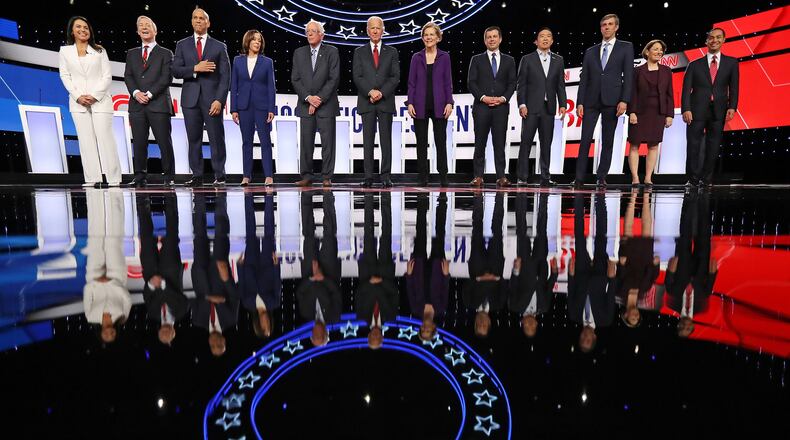In a guest column today, Amy Wilkins, senior vice president of advocacy at the National Alliance for Public Charter Schools, urges Democratic presidential candidates to go deeper on education during the debate in Atlanta and address what matters to parents, including having more options for their kids.
At Wednesday's Democratic presidential debate at Tyler Perry Studios, 10 candidates will appear in what will be their fifth face-off. Primary voting begins in February.
As an educational priority, Wilkins wants candidates to embrace putting children on the best path to thrive and succeed. To that end, she says they ought to recognize the role of high-performing charter schools in helping students of color.
In 2013, Wilkins was named Senior Fellow for Social Justice at The College Board, where she led efforts to increase AP enrollment among high achieving African American students, and addressed the achievement and attainment gaps separating middle class African American students from their white peers.
By Amy Wilkins
The leading candidates for the Democratic nomination for president will be debating in Atlanta this week and, as a life-long African-American civil rights and education advocate, I’m worried they’re going to miss the mark yet again.
In past debates, whenever a sparse few minutes focused on education, too many of the candidates pushed broad and impractical policy positions — like moratoriums on charter schools or blind, unaccountable funding of district-run schools. Others regurgitated education policies that change based on the latest poll or union scorecard. Our current and aspiring lawmakers are having the wrong debate and it’s past time they listened to us so they can get it right.
Our debate about schools should be the model for their debate. Whether we're sitting around our kitchen table helping our child work through a homework assignment or at parent-teacher conferences in our communities working together to make our schools stronger, we know what's in our kids' best interests.
Let’s be real. No parent looks into their child’s eyes and says, “Let’s make decisions about your future based on what my political party has traditionally supported.” No community has ever fought for increased opportunities at their school down the street (such as language immersion, advanced STEM, and arts classes) by first taking into account the latest proposed legislative appropriations earmark for the next fiscal year.
We have one set of criteria and a single focus: how can we put our children on the best path to thrive and succeed. The debates that presidential candidates have about the future of our children, especially concerning public schools, whether they are charter or district-run schools, must have that same singular focus.
While we’re being real, let’s also acknowledge that limiting options for our children by attacking high-performing public charter schools makes all students suffer. And it’s no secret that in that scenario, our black and brown students always get the shortest end of the stick. In fact, the vast majority of voters want to see more options not fewer for our children.
According to an October 2019 Democrats for Education Reform poll, 89% of Black Democratic primary voters, support “expanding access to more choices and options within the public-school system, including magnet schools, career academies, and public charter schools.” The poll also found that 61% of Democratic primary voters agree with former President Obama who said that his education policies sought to “promote innovation and choice in public schools and raise standards for every student.” Any candidate for president who aims to be our voice must push policies that we overwhelmingly support and know work.
When I think about the challenges facing today's students — particularly those who look like me — I am encouraged by the innovation and commitment of public charter school leaders of color across the country that I've seen with my own eyes. For example, my organization, the National Alliance of Public Charter Schools, recently released a report, "Identity and Charter School Leadership: Profiles of Leaders of Color Building an Effective Staff" which examined the ways that school leaders of color's experiences and perspectives influence how they build school culture, parent and community relationships, and effective staff. This needed report affirmed what many of us in the trenches have known for a while: We know that when teachers and school leaders of color are given the opportunity to bring their experiences and perspectives into the classroom, our students of color thrive. Charter schools are leading the way to not only encourage this diversity, but make it the norm.
Join me this week to hold the candidates accountable that they come correct with the right focus and the real facts. If their talking points devolve into arguments over charter schools versus district-run schools or school funding mechanisms and theoretical formulas, they’re not focusing on our children or protecting the educational options that have proven successful. And as far as our children are concerned, that means they’re having the wrong debate.
About the Author
Keep Reading
The Latest
Featured



